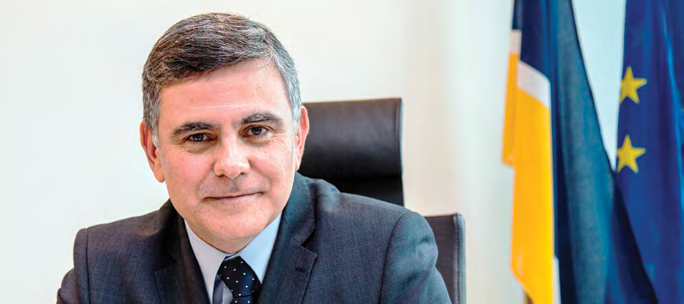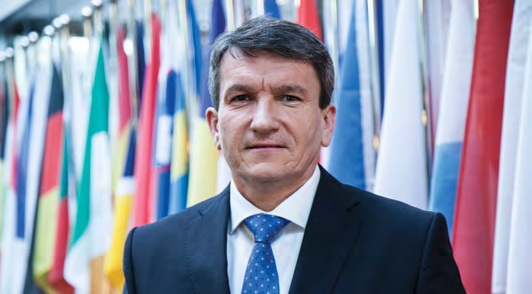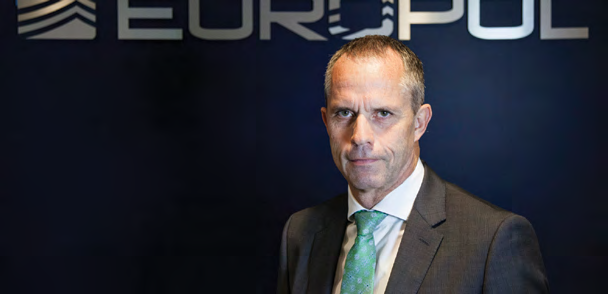
In 2017 we began a major transformation process at Europol. The new Europol Regulation will unleash Europol's ability to manage information and open the door to innovation.
Innovation is the key word for the future. The volume, variety and velocity of data are becoming overwhelming when addressed with traditional means. Crime, reflecting society, is also becoming progressively digital. In this context the gap between the problem and our ability to tackle it is increasing day-by-day with more cases, more speed and diverse data.
As the traditional approach of adding more analytical resources does not scale up indefinitely, ICT is the solution. In fact, our ICT strategy and roadmap will incorporate an unprecedented level of innovation which will be directly visible in the 2017 work plan. As a result, we expect to provide Europol analysts with instruments that are adequate for the volume and type of challenges that they are progressively facing, that reduce the need for mostly manual handling and eventually position Europol as a leader in the field and make it a go-to centre of excellence in Europe.
We will also continue to extend and improve Europol's core ICT systems in the wake of the Integrated Data Management Concept (IDMC). The interconnection to European databases, especially VIS and possibly EURODAC, will be complemented by the development of QUEST in parallel to the work of the Commission’s High Level Experts Group (HLEG) on Interoperability.
With regards to the Administration at Europol, 2016 was another challenging year due to a considerable growth of staff and budgetary resources, which increased pressure on administrative management, recruitment and housing - a trend which will continue in 2017. Important issues will concern ensuring workspaces for staff and other personnel in compliance with acceptable standards. Negotiations are ongoing with the host state to explore mid- and long-term possibilities, meanwhile short-term arrangements are already visible in the building.
Concerning human resource management, a number of initiatives are being developed and implemented aiming at facilitating internal mobility and staff allocation. Furthermore, good administration relies on efficient ICT tools. Accordingly, in coordination with ICT services, Administration is working on a number of initiatives aiming at digitalising workflows of HR-related processes. Recently, for example, the e-recruitment tool was launched, which will have a large impact on facilitating access to services and shortening the necessary time to deal with requests.
Finally, Europol will also welcome the new Head of Administration Business Area as of May 2017 who will take over the steering of these important processes.
It is obvious that 2017 represents the tipping point for a renewed Europol and I believe that with the dedicated work of a professional team of Europol staff and the ever-growing support of the Member States we will continue to encounter each challenge as a good opportunity to prove the best.

More than ever, the persistent and major challenges to the EU’s security demand that Europol works as efficiently as possible. Key to this end will be the full implementation of Europol’s new legal base, the Europol Regulation, which was adopted in May 2016 and finally became applicable in May 2017. The Regulation will translate into important and fundamental changes in the way Europol does business in all its areas of work, from data management and data protection to its external relations with third countries or private parties. Europol’s Governance Department has made major efforts to drive forward the implementation process in 2016 and its finalisation is a key goal for the rest of 2017.
Europol also continued to build and deepen its global partnerships. The Governance Department facilitated the negotiation and signing of important cooperation agreements with Brazil, Bosnia and Herzegovina, China, Georgia, the United Arab Emirates and Ukraine, and made sure Europol expands its cooperation with key partner agencies in the EU, such as Frontex and eu-LISA.
The crisis zones and vast security challenges in the EU’s immediate neighbourhood and beyond will further increase the focus on Europol’s external relations in the coming years. On the basis of its new External Strategy 2017-2020, Europol will deepen its existing network of partnerships but also exploit new possibilities under the Europol Regulation with regard to regions of growing importance such as the Middle East and North Africa. The External Strategy will guide all of Europol’s efforts to further strengthen its role as the preferred platform for international law enforcement cooperation against threats to the EU’s security.

Fraternité, Brussels, Nice, Guest Officers, increasing information flow, double the amount of searches in the EIS, launch of the ECTC, reorganisation of the Operations Department; all are among the major factors that played a significant role in the activities of the Operations Department in 2016. Surely not all of the same level and impact, but all important within a changing environment. 2016 did change the environment, the tasking and the performance of Europol, and more specifically of the Operations Department. We used it to get ready for the future by reorganising ourselves into a more flexible and centre-orientated organisation, and to support and assist the Member States in their fight against crime and terrorism. And, in doing so, we also managed to keep open the regular support with an even higher level of recognition by the Member States. This is something that I am proud of and at the same time grateful to the staff of my department.
New challenges will come up in 2017, such as getting into concrete proposed ways of working with the UK for the years to come. Getting used to the new Europol Regulation and defining the different analytical support and the new possibilities that IDMC is giving, are just a few. In 2017 we will further invest in the three Centres that have been created and in the support provided by the Front Office and the Horizontal Operational Services. The implementation of a 24/7 service has already proven to be a successful concept, as is also the early involvement in live investigations, be it on terrorism or on drugs. In this way Europol is constantly evolving, not only from collecting information but also towards connecting information, investigations and people. In March 2017 we delivered the new SOCTA, which will lead to decision-making on the European priorities for the upcoming 4 years of the Policy Cycle. Once again we will be in the position to support the operational plans by means of grants, but in a more agile and flexible way following the new provisions contained in the Europol Regulation.
This will also enable us to be part of the full investigative cycle, by providing support to all phases of investigations and supporting the frontline activities of law enforcement even more.
Of course, the unexpected will most likely still happen. We are ready to respond, we have the structure and facilities in place and the strong cooperation of our partners, not only within the law enforcement community but also with external stakeholders. All of this in order to live up to our mission to make Europe safer.